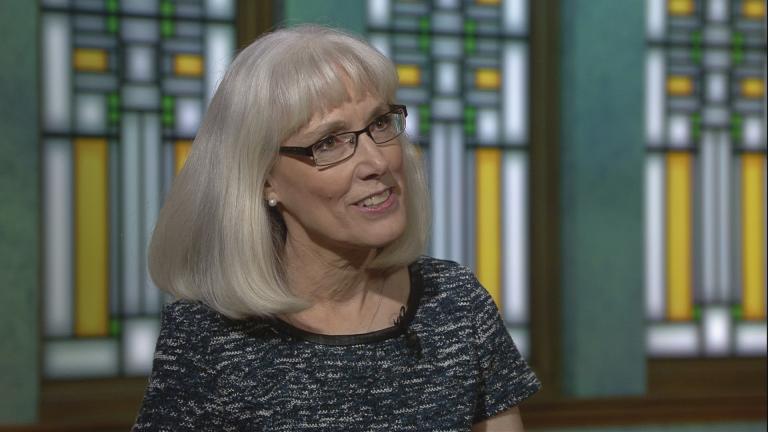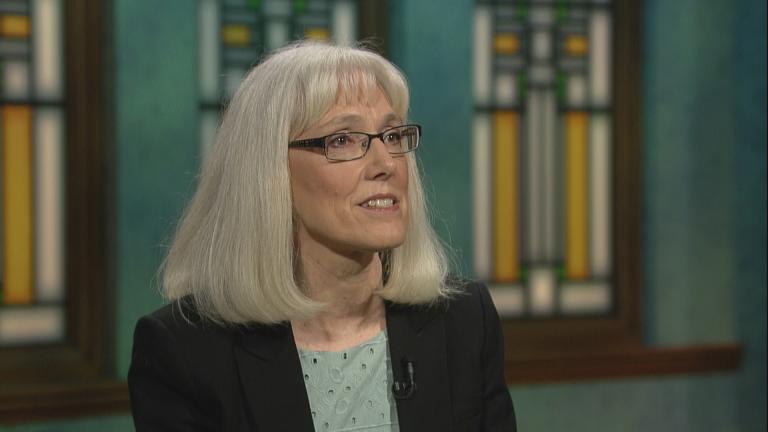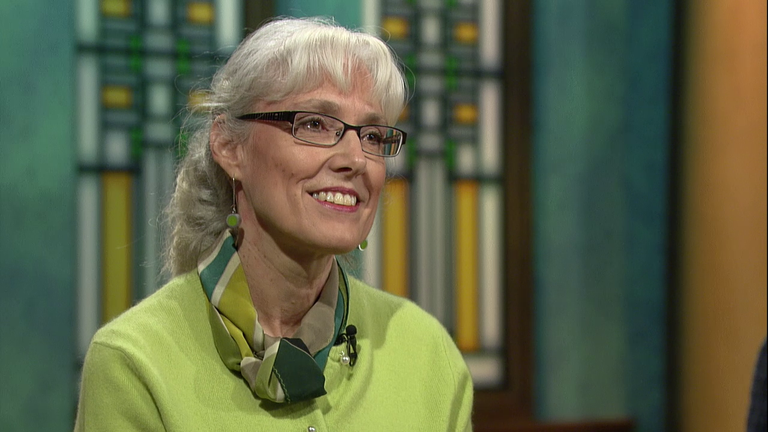Editing someone else's work – particularly someone you're close with – can often be a stressful, conflict-inducing process.
“Subversive Copy Editor” Carol Fisher Saller said she gets a lot of questions from people who are trying to edit the work of a friend, colleague or loved one.
“People don't want to offend, but they want things to be correct, and they want their friends to look good,” Fisher Saller said. “But it's like telling someone they have spinach in their teeth.”
As to the best way to point out problems diplomatically, Fisher Saller says to be selective in your feedback.
“Pick your battles and [don’t] wade in, slashing with a red pen,” she said. “Find the most egregious errors and let some of your own preferences – that aren’t necessarily incorrect – slide.”
There is also the question of proximity.
“Try not to hover when you give the person your feedback,” Fisher Saller said. “Let them look at it, maybe sleep on it, because their first reaction will probably be to be defensive.”
And when it comes to getting feedback, Fisher Saller agrees that the adage is true: Everyone needs an editor.
“Even the most professional writers who’ve been published many times have feedback from a writing group or a writing partner,” Fisher Saller said. “The average person should never feel embarrassed or ashamed if they miss a few things when they’re writing.”
Fisher Saller and host Phil Ponce discuss the new book, “But Can I Start A Sentence with ‘But’?” that collects a wide array of questions submitted to the Chicago Manual of Style Online's Q&A – and includes a foreward from Fisher Saller – in addition to the second edition of “The Subversive Copy Editor,” which includes new chapters.
Below, read an excerpt from the foreword and Chapter 4 of “But Can I Start A Sentence with ‘But’?” You can also read an excerpt here from “The Subversive Copy Editor: Advice from Chicago (or, How to Negotiate Good Relationships with Your Writers, Your Colleagues, and Yourself), Second Edition.”
![]()
Foreword
 Since 1997, readers of The Chicago Manual of Style ’s website have been submitting style and grammar questions to the Q&A page that is updated each month by manuscript editors at the University of Chicago Press. Before there was a website, we occasionally answered questions over the phone. Not that we actively solicited such queries; in fact, to be honest, they could be a little annoying. After all, it takes a certain amount of chutzpah to call up a major university press and expect an editor there to stop what she’s doing and determine whether nonfat takes a hyphen. (It doesn’t.) Nevertheless, that’s what we used to do, at no charge. A bonus for us was that sometimes we ended up having interesting conversations with curious strangers who cared as much as we did about a point of grammar or about formatting a citation properly. Occasionally, a conversation led to an improvement in the recommendations we offer in the Manual.
Since 1997, readers of The Chicago Manual of Style ’s website have been submitting style and grammar questions to the Q&A page that is updated each month by manuscript editors at the University of Chicago Press. Before there was a website, we occasionally answered questions over the phone. Not that we actively solicited such queries; in fact, to be honest, they could be a little annoying. After all, it takes a certain amount of chutzpah to call up a major university press and expect an editor there to stop what she’s doing and determine whether nonfat takes a hyphen. (It doesn’t.) Nevertheless, that’s what we used to do, at no charge. A bonus for us was that sometimes we ended up having interesting conversations with curious strangers who cared as much as we did about a point of grammar or about formatting a citation properly. Occasionally, a conversation led to an improvement in the recommendations we offer in the Manual.
After we discontinued the phone-query service and invited the entire planet to seek our advice online, demand quickly exceeded our ability to answer and still meet our deadlines. So we decided to choose a few of the most interesting questions and answer them in a monthly online Q&A. The posted questions and answers go into an archive that is searchable to anyone with an Internet connection. The archive contains only questions that were featured in the Q&A; regrettably, many more remain unanswered. We are often asked why we don’t provide a help line to serve a greater number of readers. The answer is simple: all our advice is given by senior editors with years of experience at the Press—“power users” of CMOS who have personally assisted with revising the Manual into new editions. They already have their hands full editing the more than three hundred new books we publish each year, and we aren’t willing to settle for helpers with less expertise. As you might imagine, among the questions readers submit, we get some doozies. The Chicago Manual of Style ’s thousand- plus pages of style and grammar and citation guidelines can bewilder a person whose teacher or boss drops the book on their desk and says, “Follow this.” We do our best to help: The book (both print and online) has detailed tables of contents at the start of each chapter. It has a killer index. The online edition is fully searchable, and there’s a free online “Quick Guide” that gives examples of how to cite many of the most common types of sources as a note or in a bibliography. And yet we get questions. Endless, inventive, heartbreaking.
Chapter 4: “Can fewest mean zero?”
Grammar and style can be tricky. Editors who make a career out of understanding them can become just as confused as the next Joe when the language catches us off guard. Sometimes not even a grammar book or style guide can lead us from the wilderness. This is when we turn to usage manuals and dictionaries for additional help.
Usage is a category that overlaps with grammar but slides into grayer areas involving regionalisms, jargon, and nonstandard forms of English. Sometimes, sorting out acceptable grammar and usage calls for more than a reference book. Sometimes, we actually have to . . . think.
Q. Can fewest mean zero? Example: Which desk has the fewest books? If one desk has no books, does that desk contain the fewest? Or must fewest refer to a number (however small) that is greater than zero?
A. Think about the desk. If it doesn’t have more books than the other desks, and it doesn’t have the same number of books, what’s left? It must have the fewest. But if several desks have no books, then our desk does not have the fewest, and it’s clearer to say that it has no books. (Was that a trick question?)
Q. Dear Sir or Madam, I am taking a course on Hispanic linguistics. As part of a project that has been assigned by my professor, I just learned that there is an institution that regulates the usage of the English language (in the United States? Great Britain?). I would like to read more about it. It is my impression that The Chicago Manual of Style has part of the job of regulator of the English language. Is this true?
A. If only! But no—there is no institution that can regulate language in the United States or Great Britain, although there are organizations that sometimes pretend to. In both countries people are free to speak and write as they wish. The Chicago Manual of Style is a guide for writers who want to write in standard English and use a standard citation format. You can start your research by reading about “ language regulators ” at Wikipedia.
Q. Is it “happy medium” or “happy median”? The author writes: “We would all be much better served as stewards of finite public funds if we could find that happy median where trust reigns supreme.” Thanks!
A. The idiom is “happy medium,” but I like the image of commuters taking refuge from road rage on the happy median.
Q. I write professional résumés, and I have a question about the use of a comma in a sentence with including. My proofer has begun inserting a comma prior to including followed by a list: “Managed a variety of projects, including joint, combined, and contingency exercises.” Should this comma be omitted?
A. Many readers write to ask whether the word including always requires a comma in front of it, but there’s no simple answer. Each instance must be decided individually, because a comma changes the meaning.
I invited all the clubs including biker chicks and pit tootsies.
I invited all the clubs, including biker chicks and pit tootsies.
The first sentence is ambiguous; it might mean that I invited only clubs that include biker chicks and pit tootsies among their members. The second sentence makes clear that I invited all clubs, regardless of membership, and that this included the chicks’ and tootsies’ clubs. In your text you need a comma if the chunk after including is nonrestrictive (that is, if some of the projects included joint exercises, some included combined, some both, etc.). Without a comma, including becomes restrictive, and the implication is that every project included joint, combined, and contingency exercises.
Q. I have seen some texts using the pronoun her to refer to a business: “Apple’s profit was high due to her impressive product designs.” I would like to learn when I should use the feminine pronoun and when I should avoid it.
A. Use the feminine pronoun when referring to a female person or animal. Avoid using it to refer to a business, a ship, or any nonliving entity—especially in the presence of a female person.
Q. Dear Sir or Madam, I’m having a disagreement with a coworker on a particular subject, and as my CMOS is at home, I can’t go to it for a ruling. I’m arguing that the prohibition against ending a sentence with a preposition is an invalid injunction—one that often serves to confuse and befuddle the reader by forcing tortured and mangled word placements. She says that the “rule” must be followed. So, is it appropriate to end a sentence with a preposition? Thank you.
A. That old prohibition is what we call a grammar superstition. You will not find it in any authoritative grammar book. Please see CMOS 5.176.
Q. I’ll often hear people say “me and Kathy,” not “Kathy and me.” Shouldn’t me come after the person’s name? “Kathy and me,” not “me and Kathy”?
A. Yes. When me is used in a compound object, it normally comes last: The message was sent to Kathy and me. There are times when it might be fine to put me first, however, such as when I am the primary object and other people are not equally emphasized: The threat was directed at me and everyone I’d been in contact with since that day. If you’re talking about a compound subject (as opposed to object), the correct phrase is “Kathy and I”: Kathy and I told them. If me is used as a subject, it doesn’t really matter which way you decide to be wrong.
Q. Can I use the first person?
A. Evidently.
Reprinted with permission from But Can I Start a Sentence with "But"? Published by the University of Chicago Press. © 2016 by The University of Chicago. All rights reserved.
Sign up for our morning newsletter to get all of our stories delivered to your mailbox each weekday.
Related Stories from “Chicago Tonight”
 The Subversive Copy Editor Takes on Grammar’s Zombie Rules
The Subversive Copy Editor Takes on Grammar’s Zombie Rules
Oct. 8, 2015: Split infinitives, over versus more than, and passive voice—fewer things have a tendency to launch otherwise reasonable people into a lengthy professorial lecture than real or perceived violations of immutable grammar and style rules. But Carol Fisher Saller has little time for immutable rules, so she's loading up her gear and joining “Chicago Tonight” to take on some zombies rules.
June 22, 2015: Carol Fisher Saller's principles of copy editing might surprise anyone who's ever tussled with an editor over a piece of writing. She argues communication and collaboration between writer and editor are key; style rules are useful guidelines, not the straps of a straitjacket; and that language's evolution isn't anything to rail against. She joins “Chicago Tonight.”








